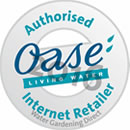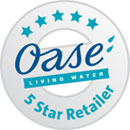Pond Fish Question and Answers
Welcome to Water Gardening Direct, your "One-Stop solution" for all your
Pond Equipment, Water Features and Spare Parts.
We hope our site has all the Help and Advice you need, but if not
please feel free to give us a call on 01778 341199
Pond Equipment, Water Features and Spare Parts.
We hope our site has all the Help and Advice you need, but if not
please feel free to give us a call on 01778 341199
or click here to order or download our FREE Brochure
Ordering Online
Delivery Information
Product Returns
Terms and Conditions
Sales Within The EU
New Products
Other Information
WEEE Directive and
Battery Recycling
Water Gardening Direct, Hards Lane, Frognall, Deeping St. James, Peterborough, PE6 8RL
Tel: 01778 341199 - Fax: 01778 341188 - Click here to email us
© 2001 - Water Gardening Direct
Refresh
- Help and Advice
- Pond Products
- Pond Liners and Accessories
- Preformed Ponds
- Oase PondEdge System
- Oase Rockways Water Course Features
- Stream or Waterfall Headers / Spillway
- Pond Filter Hides
- Building Your Pond Or Water Feature Special Offers
- All In One - Pond Filters
- Combined Pond Filter, UV and Pump Packages
- Combined Pond Filter and UV Units
- Pond Filter Pumps
- Pond Fountain Pumps
- Solar Fountain Pumps
- Pond Filter Units
- Pond Ultra Violet Lights
- Pond Air Pumps
- Oase Lake Management
- Flexible Hose and Fittings
- Rigid Pipework and Fittings
- Solvent Weld Pipework And Fittings
- Electrical Accessories
- Electronic Blanket Weed Treatment
- Spare Parts
- Pumping and Filtering Special Offers
- Oase Pond Wall Water Spouts
- Pond Ornaments
- Oase Floating Mallards and Ducklings
- Pond Misters
- Oase Rockways Watercourse Features
- Garden and Underwater Pond Lights
- Oase Pond Fountain Jets and Lights
- Create a Unique Look And Feel Special Offers
- Water Features
- Solar Bird Bath Water Features
- Solar Powered Water Features
- Smart Solar Accessories
- Smart Solar Spare Parts
- Oase Stainless Steel Waterfalls - 30 / 60 / 90cm Water Blades
- Oase Stainless Steel XL Waterfalls - 30 / 60 / 90cm XL Water Blades
- Pontec PondoFall LED - Water Blade / Watercourse Header
- Oase Waterfall Illumination LED Lighting Strips
- Plastic Water Feature Reservoirs
- Metal Grids for Plastic Reservoirs
- Plastic Cover Plates for Plastic Reservoirs
- Rectangular Water Blade Reservoirs
- Oase Water Feature Reservoirs
- Oase Water Wall Reservoirs
- Oase Silent Splash Diffusers
- Oase Watercourse Spring / Spillway Box
- Garden Products
- Spare Parts
- D.I.Y Filter Foam Sets
- Replacement Ultra Violet - UVC Lamps
- Replacement Ultra Violet - Quartz Sleeves
- Black Knight Filter Brushes
- 5mm - 8mm Pond Filter Wool / Floss
- Oase Hel-X 13mm Filter Media - 25L Bag (42904)
- Evolution Aqua K1 Filter Media
- Oase Turmsilon GTI 300 GK (Silicone Grease) 10ml (27872)
- Spare Parts Special Offers
- Pontec Replacement Solar Remote Controller
- Pontec MultiClear 5000 / 8000 Pond Filter Spare Parts
- Pontec MultiClear 15000 Fish Pond Filter Spare Parts
- Pontec PondoMax 1500 - 17000 Pond Pump Spare Parts
- Pontec PondoMax Eco Control 8500 - 17500 Pond Pump Spare Parts
- Pontec PondoMatic 3 Vacuum Spare Parts
- Pontec Pondorell 3000 Complete Pond Filter Spare Parts
- Pontec PondoVario 750 - 3500 Fountain Pump Spare Parts
- Pontec Misc Spare Parts
- Oase Pond Filter Spare Parts
- Oase Pond Pump Spare Parts
- Oase Ultra Violet Light Spare Parts
- Oase Pond Vacuum Spare Parts
- Oase AquaSkim 20 - 40 Spare Parts
- Oase AquaOxy Air Pump Spare Parts
- Oase ProfiClear Guard Spare Parts
- Oase SwimSkim 25 - 50 Pond Skimmer Spare Parts
- Oase AquaAir Eco 250 Spare Parts
- Oase LunAqua 3 Halogen Lighting Spare Parts
- Oase FM Master and InScenio Home / Cloud Spare Parts
- Oase Misc Spares Parts
- Hozelock Air Pump Spares
- Hozelock Aquaforce 1000 - 4000 Spares
- Hozelock Aquaforce 6000 - 15000 Spares
- Hozelock Bioforce Spares
- Hozelock Bioforce Revolution Spares
- Hozelock Cascade Spares
- Hozelock EasyClear Spares
- Hozelock EcoPower Plus Spares
- Hozelock Titan Pump Spares
- Hozelock Vorton 2200 - 27000 UV Spares
- Hozelock Vorton 11 - 55 UV Spares






